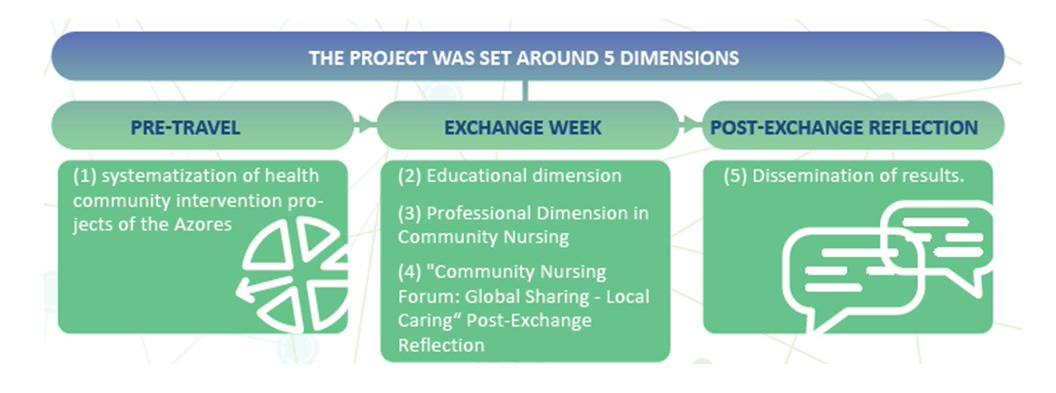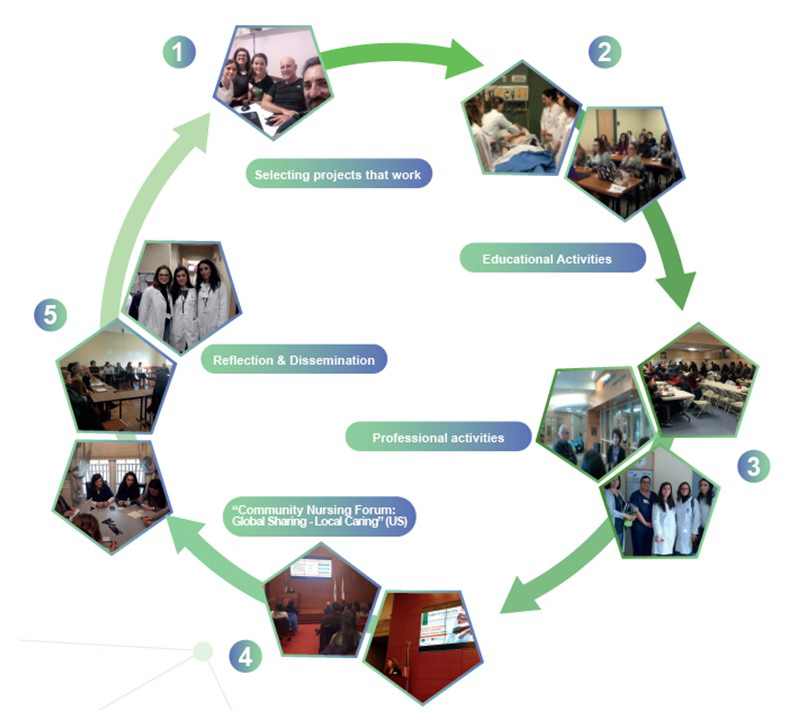Summary
The Global Sharing-Local Caring project emerged from the dynamics of specialized training in community nursing between the University of the Azores (UAc), Portugal and the University of Massachusetts Dartmouth (UMass Dartmouth), United States (U.S.). Considering today’s globally minded health care environment and the increased importance of nurses' knowledge and skills to meaningfully interact with people from different cultures and ethnic backgrounds, this project represents a unique learning opportunity that allows improved health benefits at the local level and advancements in the provision of nursing care in both regions involved.
Background
An undergraduate student exchange “Bridging the Atlantic” between UAc and UMass Dartmouth was established in 2015. An evaluation of this student nurse exchange resulted in meeting and exceeding program outcomes and student expectations.1 It became clear that students gained an understanding of cultural differences, recognized a different health care system, reconsidered the role of the nurse, facilitated in building teams, integrated theory into practice, and engaged in peer mutual learning that was beyond their expectations.1
The state of Massachusetts, U.S. has the largest number (320,000) of residents with ancestry from Portugal.2 The ties between Portugal and the U.S. are strong, especially in the cities near UMass Dartmouth, where the highest percentage of Portuguese residents live and work,3 thereby allowing the sharing of a common culture.
The question, “If the impact on undergraduate student nurses and the global communities they worked in was far reaching, what might the impact of a similar model of sharing ideas and philosophies of community health nurses practicing in Portugal and the U.S. be if they were able to brainstorm face to face?” was poised. The belief that through global sharing, nurses from two separate countries could expand the ties between academic and health care institutions, prioritize essential nursing competencies, and identify best practice methodologies to provide specialized care to vulnerable groups across the lifespan in their local communities could be realized.
Innovative Solution: Nurses Sharing Ideas Related to Community Nursing
The Global Sharing, Local Caring project was set around five dimensions: Pre-travel 1) Systematization of community health intervention projects in the Azores; Travel week 2) Educational dimension, 3) Professional dimension related to community nursing, 4) Community Nursing Forum; and Post Travel 5) Reflection and dissemination.

Figure 1: Global Sharing Local Caring Framework
Five post-graduate students and two faculty in a community nursing program from the UAc School of Health travelled to the UMass Dartmouth College of Nursing and surrounding area for one week to engage in face to face meetings, hospital visits, the opportunity to shadow a nurse in a community health care center, engage in community service, participate in discussions related to social determinants of health, and share in a dialogue with diverse community partners.
The sharing of philosophical, theoretical, practical, and clinical knowledge among nurses who, from different contexts and cultural, geographical, political, and organizational points of view, shared the challenges they faced and brainstormed solutions to overcome them. This unique collaboration allowed them to provide healthcare to vulnerable groups with a commitment to best practices in their local communities.

Figure 2: Global Sharing Local Caring
Distinction
This innovative approach to sharing ideas among post graduate community nurses from a global perspective seemed as effective as in undergraduate students. Although as these post graduate nurses from each university collaborated in planning a forum at UMass Dartmouth with nurses and faculty presentations from both universities, the dialogue was expanded to include an audience of students, faculty, administrators, and community stakeholders.
Presentation topics included an overview of the role of a specialist in community health nursing, implementation of a weight loss program among technical assistants at a hospital in Portugal, increasing the number of nurses immunized for influenza in the Azores, mitigating caregiver burden of families caring for Alzheimer’s patients in Massachusetts through education and support, impact of foot care in men and women living in a homeless shelter, a nurses experience in Haiti, and inclusion of art in a women’s prison. An open community forum closed the experience with continuing discussion related to areas of convergence and divergence among nursing practice in each country.
Implications/Impact
Sharing philosophical, theoretical, practical, and clinical knowledge among post-graduate community nurses allowed them to critically reflect on the adequacy of their own practice and consider the transfer of best practice ideas as discussed and observed into their own practice.
Portuguese faculty and students held meetings in their nursing communities to reflect upon and disseminate an overview of their experiences and new knowledge gained in relation to the five dimensions of the project. Global sharing through brainstorming and implementation in their local practice areas were more widely disseminated through newspaper and television outlets and social media.
Conclusion
Nurses who participate in the global sharing of ideas, challenges, and brainstorming of solutions in delivering care are well poised to implement new and creative strategies when providing care in their own communities. Professionals and students interested in a global intersectoral approach to addressing social determinants of health and vulnerability in their local community might consider a similar opportunity. The goal to increase the development of specialized skills in community health through reflective thinking following global dialogue can be realized through global sharing-local caring initiatives.
Funding
The project was funded by the Fundação Luso-Americana para o Desenvolvimento (FLAD) through the “Crossing the Atlantic” program.
Works Cited
1. Helder Rocha Pereira, Maryellen D. Brisbois, Helena Oliveira Silva, & Caitlin M. Stover, “Learning beyond expectations: Evaluation of an international nursing student exchange,” Journal of Nursing Education and Practice 8 (2018): 72-82, doi: 10.5430/jnep.v8n2p72
2. United States Census Bureau, “How many Portuguese live in Massachusetts” (2010), Accessed July 22, 2018, www.census.gov/quickfacts/
3. Zipatlas, “Percentage of Portuguese Living in Massachusetts by City” (2017), Acccessed July 22, 2018, zipatlas.com
Authors’ bios
Helder Rocha Pereira, PhD, RN, is the Coordinator Professor at University of the Azores School of Health (UAc).
Alberto C.M. Duarte, MS, RN, is the Adjunct Professor at UAc School of Health.
Maryellen Brisbois, PhD, RN, is the Assistant Professor at UMass Dartmouth College of Nursing.
Barbara Quintanova is the RN Post-Graduate Student at UAc School of Health.
Raquel Dutra, MS, RN, is a Post-Graduate Student at UAc School of Health.
Rita Marques, MS, RN, is a Post-Graduate Student at UAc School of Health.
Sara Raposa, MS, RN, is a Post-Graduate Student at UAc School of Health.
Sofia Cordeiro, RN, is a Post-Graduate Student at UAc School of Health.


